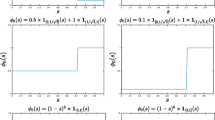Abstract
In opinion dynamics, the convergence of the heterogeneous Hegselmann-Krause (HK) dynamics has always been an open problem for years which looks forward to any essential progress. In this short note, we prove a partial convergence conclusion of the general heterogeneous HK dynamics. That is, there must be some agents who will reach static states in finite time, while the other opinions have to evolve between them with a minimum distance if all the opinions does not reach consensus. And this result leads to the convergence of several special cases of heterogeneous HK dynamics, including when the minimum confidence bound is large enough, the initial opinion difference is small enough, and so on.
Similar content being viewed by others
References
Castellano C, Fortunato S, Loreto V. Statistical physics of social dynamics. Rev Mod Phys, 2009, 81: 591–646
Jia P, MirTabatabaei A, Friedkin N E, et al. Opinion dynamics and the evolution of social power in influence networks. SIAM Rev, 2015, 57: 367–397
Oliva G, La Manna D, Fagiolini A, et al. Distributed data clustering via opinion dynamics. Int J Distrib Sensor Netw, 2015, 11: 753102
Krause U. A discrete nonlinear and non-autonomous model of consensus formation. In: Communications in Difference Equations. New York: Gordon and Breach Publisher, 2000. 227–238
Hegselmann R, Krause U. Opinion dynamics and bounded confidence models, analysis, and simulation. J Artif Societ Social Simul, 2002, 5: 1–33
Lorenz J. A stabilization theorem for dynamics of continuous opinions. Physica A, 2005, 355: 217–223
Lorenz J. Continuous opinion dynamics under bounded confidence: A survey. Int J Mod Phys C, 2007, 18: 1819–1838
Blondel V D, Hendrickx J M, Tsitsiklis J N. On Krause’s multi-agent consensus model with state-dependent connectivity. IEEE T Automat Contr, 2009, 54: 2586–2597
Mirtabatabaei A, Bullo F. Opinion dynamics in heterogeneous networks: Convergence conjectures and theorems. SIAM J Control Optim, 2012, 50: 2763–2785
Etesami S R, Basar T. Game-theoretic analysis of the hegselmannkrause model for opinion dynamics in finite dimensions. IEEE T Automat Contr, 2015, 60: 1886–1897
Chazelle B, Wang C. Inertial Hegselmann-Krause systems. IEEE T Automat Contr, 2016, 1–1
Liu K X, Wu L L, Lü J H, et al. Finite-time adaptive consensus of a class of multi-agent systems. Sci China Tech Sci, 2016, 59: 22–32
Author information
Authors and Affiliations
Corresponding author
Rights and permissions
About this article
Cite this article
Su, W., Gu, Y., Wang, S. et al. Partial convergence of heterogeneous Hegselmann-Krause opinion dynamics. Sci. China Technol. Sci. 60, 1433–1438 (2017). https://doi.org/10.1007/s11431-016-0615-x
Received:
Accepted:
Published:
Issue Date:
DOI: https://doi.org/10.1007/s11431-016-0615-x




